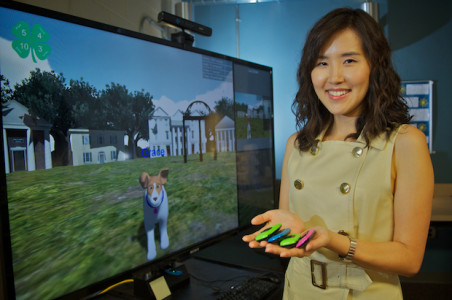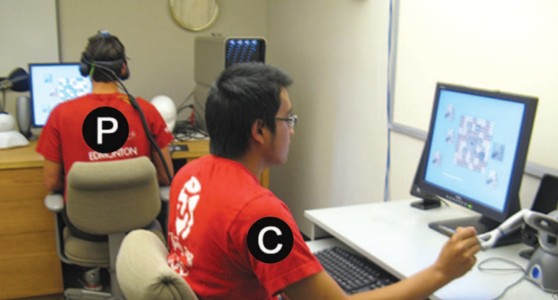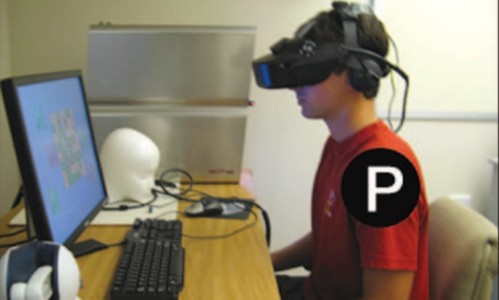There’s been quite a bit of debate about whether violent video games can make people more violent in real life — though no conclusive research. With the advent of virtual reality — immersive, interactive experiences in which users feel as though they are actually characters inside a different world — this debate is likely to become even more heated.
But it’s not enough to look at whether virtual reality can make people more violent — the opposite might also be true.
And, in fact, according to a new study from the University of Georgia, virtual reality experiences can actually make people nicer, and more empathetic.
The research, conducted by Sun Joo (Grace) Ahn, an assistant professor of Grady College of Journalism and Mass Communication at the University of Georgia, studied the potential of the virtual reality technology to improve society by enhancing empathy and encouraging more considerate behaviours.

One of the studies aimed at fostering empathy with persons with disabilities and increasing favorable attitudes toward them. The participants of the study wore head goggles that allowed them to experience a three-dimensional virtual simulation of red-green colorblindness.
“Using virtual reality we are able to put you literally in the shoes of the person with a disability,†Ahn told Hypergrid Business. “So you can see the world through the eyes of a person with colorblindness.â€
A vivid sensory rich experience provided by the virtual simulation resulted in the participants feeling significantly more sympathetic toward the color blind compared to those who merely imagined having this disability.
“I felt bad for the colorblind person,” said one participant of the experiment. “Certain situations can be really tough when you’re colorblind.”
The results of the study have shown that the sense of being another person transfers to the physical world and translates into actual helping behavior.
In fact, just a few minutes of the virtual reality experience was enough to motivate participants to invest significant amount of time and effort to help people with colorblindness.
“I felt like a colorblind person,” said another participant of the experiment. “I felt like I was in a whole different world. It made me realize how tough it is for them to do certain things in life, such as drive.”

The research conducted at Stanford university demonstrated the ability of the virtual reality technology to encourage prosocial behavior in the physical world. The participants of the study played a superhero-game, in which they flew around the city looking for a diabetic boy in need of medicine.
The results of the experiment indicated that having the ability to fly like a superhero does, in fact, lead to greater helping behavior in the real world after the virtual experience is over.

Applying virtual reality for encouraging perspective taking
According to Ahn, virtual reality technology could be used potentially for diversity trainings in different organizations.
“We could put the doctor in the shoes of the patient and change their perspectives, so maybe they could communicate with the patient a little bit better,†she said.
Virtual reality can improve mutual understanding, she said, and encourage successful collaboration between people of different cultures, genders, ethnicities. It may also be used for things like bullying, especially for young children and young adults.
“It’s potentially possible for us to build a virtual reality simulation where bullies could experience being a victim,†she said. “We could make bullies a little bit empathic towards the victim.â€
The ability of the virtual reality to influence people’s perspectives can also qualitatively transform the way we appreciate the news.
If you simply read a war story, you may perceive large psychological distances between yourself and the war and feel that it’s not personally relevant to you, said Ahn. Virtual experience lets you feel what it’s like to be in the war zone or in the center of the problem, which is especially impactful for drawing attention of a global citizen to the world issues.
“The degree with which your story resonates with the audience is going to be really important to the future of journalism,†she said.
From health to education, art to government — virtual reality will increasingly make its presence felt and change the way we perceive things.
There are bound to exist presumptions among social scientists about negative effects virtual reality may cause. Just like games that depict violence, or the negative impact of the Internet and even TV back in the day.
“Every technology doesn’t really create something new, but it amplifies what we already have,” said Ahn. “People can be good or bad and technology makes it a little bit more impactful. I think it’s really important for scholars to study both sides and learn how virtual reality could help us live better lives.â€
- Virtual theater opens new doors for performance artists - August 27, 2015
- Virtual reality breathes life into immersive storytelling - January 11, 2015
- Virtual reality can make us nicer - November 22, 2014
